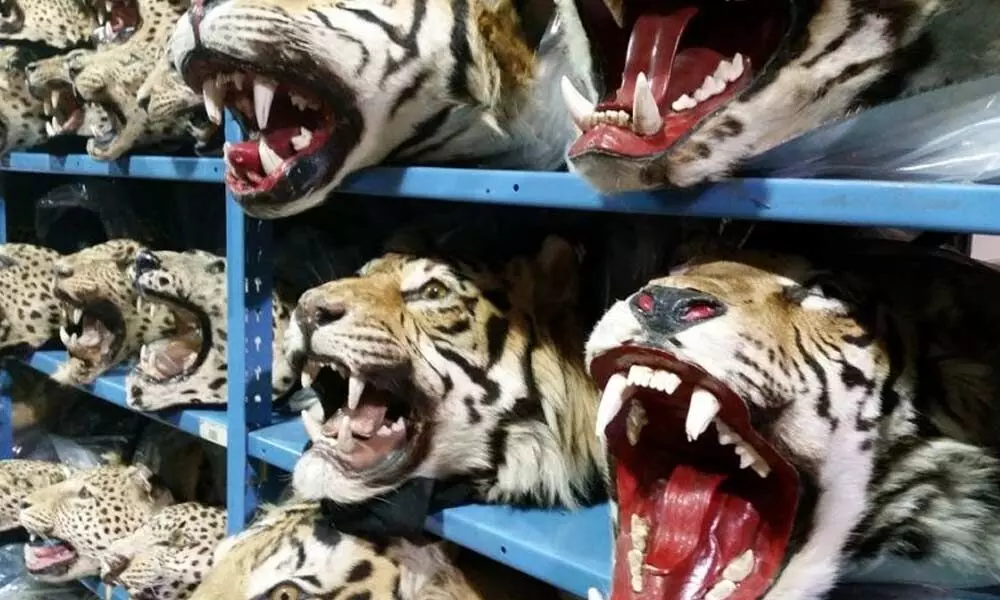Illegal wildlife trade through Indian airports threatens conservation

Illegal wildlife trade through Indian airports threatens conservation
Over 70,000 native and exotic wild animals, including their body parts or derivatives (weighing around 4000kg) were trafficked through 18 Indian airports between 2011-2020, according to a latest study conducted by a global wildlife trade monitoring network.
Over 70,000 native and exotic wild animals, including their body parts or derivatives (weighing around 4000kg) were trafficked through 18 Indian airports between 2011-2020, according to a latest study conducted by a global wildlife trade monitoring network.
The study released on Wednesday by TRAFFIC - a leading non-governmental organisation working globally on trade in wild animals and plants in the context of both biodiversity conservation and sustainable development--found that traffickers are exploiting the growth of the aviation sector to move illegal wildlife products across India and its international borders.
TRAFFIC said it's "HIGH FLYING: Insight into wildlife trafficking through India's airports" analysis found the trafficking of over 70,000 native and exotic wild animals, including their body parts or derivatives (weighing around 4000kg) in 141 wildlife seizure incidents at 18 Indian airports between 2011-2020".
To help end wildlife trafficking through India's airports, a new and one of its kind project by TRAFFIC, India Office UN Environment Programme, WWF-India, Wildlife Crime Control Bureau, Government of India has been launched at National Academy of Customs, Indirect Taxes & Narcotics (NACIN), it said.
It said 46 per cent of seizures were reptiles, including the Vulnerable Indian Star Tortoise, in which traffickers clearly disregard the international rules prohibiting its trade to protect the species. The study has found that Chennai International Airport in Tamil Nadu recorded the highest number of wildlife seizure incidents (36.1 per cent of total cases), followed by Chhatrapati Shivaji International Airport, Mumbai, Maharashtra (14.8 per cent) and Indira Gandhi Airport, New Delhi (11.3 per cent).
"Reptiles were the most encountered group among the species seized during the study period (46 per cent), followed by mammals (18 per cent), timber (13 per cent), and species from the marine environment (10 per cent)", it said.
The analysis of reported seizures made at the Indian airports between 2011-2020 found that several native wildlife species ranging from Indian Star Tortoise Geochelone elegans to Common Leopard Panthera pardus cubs were seized.
It also found many exotic species such as Red-eared Slider Turtle Trachemys scripta elegans, iguana, python, spider, marmoset, Tamarin Monkey Saguinus spp, Tricolour Squirrel Callosciurus prevostii, and exotic birds were seized from check-in and hand baggage at various Indian airports during the study period.
Similarly, several flora species, including Agarwood Aquilaria malaccensis, Red Sanders Pterocarpus santalinus, Sandalwood Santalum album, and medicinal and aromatic plants (MAP) like Kuth Saussurea costus roots were seized at the airports.
In India, wildlife is protected against hunting, trade, and other forms of exploitation through the Wildlife (Protection) Act of 1972 of India.
"TRAFFIC's study of wildlife seizures at Indian airports between 2011-2020 reinstates the need to strengthen enforcement efforts to curb the exploitation of the airline sector for conducting illegal wildlife trade," said Dr Saket Badola, Head of TRAFFIC's India Office, the lead agency responsible for developing and implementing new awareness and capacity building tools.
TRAFFIC said organisations have joined forces to develop a suite of tools to arm enforcement officials with the knowledge and skills to combat this crime that fuels declines in many Indian and international species.
"We thank UNEP and our partners for their support in launching a first of its kind project in India focused on working with enforcement officials to detect and deter wildlife trafficking through airports", Badola said.
Atul Bagai, Head of the United Nations Environment Programme Country Office in India, said illegal wildlife trade through airports is a major conservation threat magnified by the growth in the airline sector.
Tilotama Varma, Additional Director, WCCB, said airports have emerged as a popular mode for transporting wildlife contrabands due to the shorter travel time and extensive reach.
"Traffickers smuggle wildlife and their derivatives through checked luggage and personal baggage, by concealment of wildlife contraband within passenger clothing, footwear, and other wearables and through the wrong declaration of protected species, all of which makes detection cumbersome for enforcement agencies. The newly developed resources under the project will prove useful for bridging such gaps," Varma said.
Ravi Singh, Secretary-General & CEO, WWF-India said, "Wildlife needs our support more than ever due to the ever-increasing threats due to human interventions, climate change and illegal wildlife trade. The new project engages with nodal agencies at airports and helps to increase the awareness and prevention of illegal wildlife trade".















